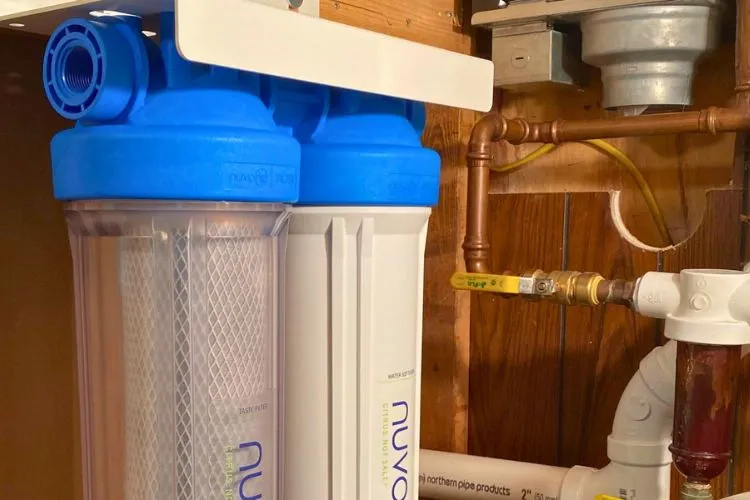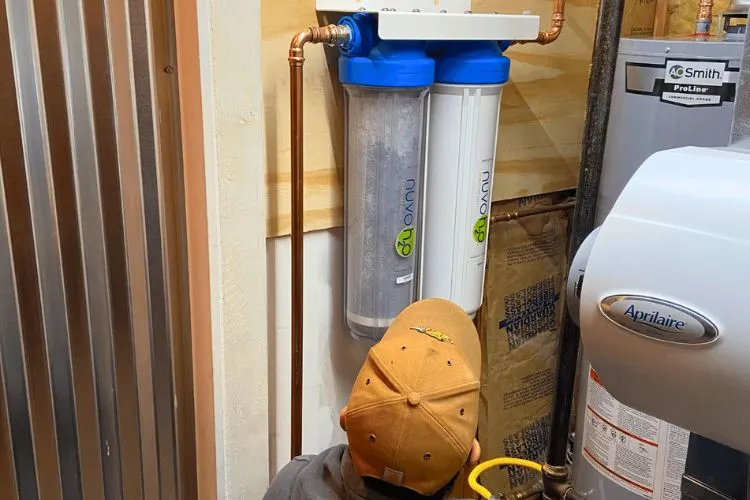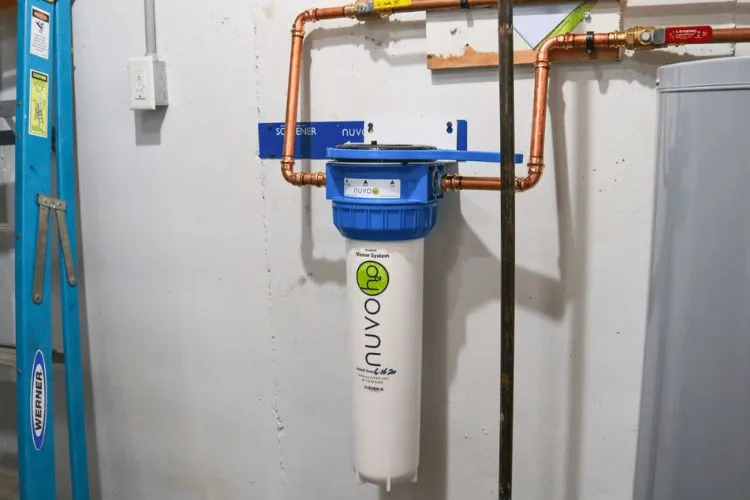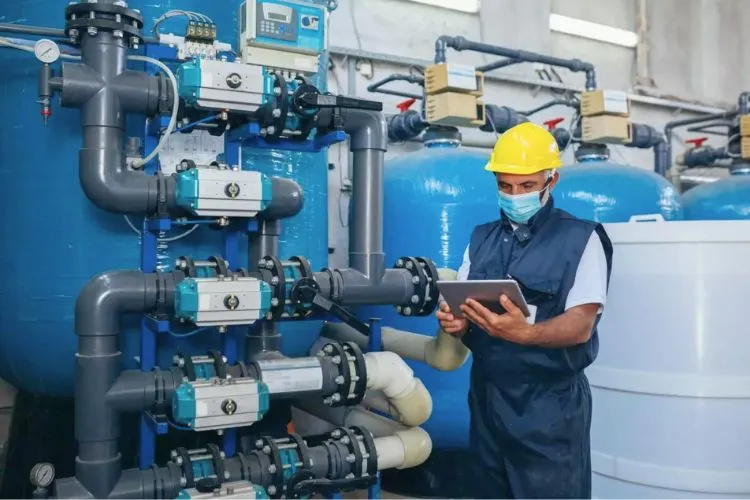Water softening stands as a critical process for many homeowners, battling against the effects of hard water.
Among the diverse methods available, citric acid water softeners have sparked interest.
But, do citric acid water softeners work in real life scenario?
Well, these softeners promise an eco-friendly and efficient way to tackle water hardness without the salt-based approach prevalent in traditional systems.

💦 What Are Citric Acid Water Softeners?
Citric acid water softeners offer a unique method to combat water hardness. Unlike salt-based counterparts that replace hard minerals like calcium and magnesium with sodium, these softeners utilize citric acid.

This natural component binds with hard water minerals, preventing them from forming scale. This difference marks a fundamental shift in how we approach water softening, aiming for a less invasive and more environmentally friendly method.
💦 Do Citric Acid Water Softeners Work?
Yes, they do work, in fact, the science behind citric acid water softeners is fascinating. The process involves a chelation where citric acid binds to calcium and magnesium ions.
As a result, these ions can’t adhere to surfaces as scale. This action is gentle and does not add sodium to the water, making it a preferred choice for many seeking a healthier alternative.
💦 Benefits of Citric Acid Water Softeners

Environmental Benefits
Citric acid softeners shine in their minimal environmental impact. They don’t contribute to excess sodium in wastewater, a significant benefit for the ecosystem.
Traditional salt-based systems can harm local waterways and wildlife, making the citric acid method a responsible choice.
Health and Safety Advantages
For households mindful of sodium intake, citric acid softeners provide a solution. By not adding sodium to softened water, these systems are safer for people on low-sodium diets. Additionally, the absence of harsh chemicals makes them a safer choice around the home.
Efficiency in Water Softening
Despite common misperceptions, citric acid softeners are remarkably efficient. They effectively treat water hardness, preventing scale buildup and prolonging appliance life. Their performance makes them a formidable option against traditional softening methods.
💦 Limitations and Considerations
Citric acid water softeners may not be ideal for all situations. Extremely hard water might reduce their efficiency, and initial setup costs can be higher than traditional systems. However, these considerations are often balanced by long-term savings and environmental benefits.
💦Installation and Maintenance
Installing a citric acid water softener follows a straightforward process, generally involving a tank system that integrates seamlessly with home plumbing.
Maintenance involves regular monitoring and replenishing the citric acid solution, simpler and potentially safer than handling salt bags.
💦 Case Studies and Consumer Reviews
Feedback from users highlights the effectiveness of citric acid water softeners in diverse settings.
Many report significant reductions in scale, softer skin and hair, and improved appliance efficiency. These real-life experiences provide valuable insights into the capabilities of these systems.
💦 Comparison with Other Water Softening Technologies
Reverse Osmosis (RO) Systems
Pros
✅ RO systems remove a wide range of contaminants, including salts, bacteria, and certain chemicals.
✅ They provide purified water, suitable for drinking and cooking
Cons
❌ RO systems can be wasteful, as they often reject several gallons of water for every gallon purified.
❌ They require more maintenance and periodic membrane replacement.
Ideal Applications
✔️ Best for households in need of high-purity drinking water.
✔️ Areas with a broad spectrum of water contaminants beyond just hardness.
Magnetic and Electronic Water Softeners
Pros
✅ These systems are salt-free and emit no chemicals or substances into the water or environment.
✅ There is no need for ongoing maintenance or added materials like salts or acids.
Cons
❌ The effectiveness of these systems can be inconsistent, with varied results reported by users.
❌ They may not be as effective in reducing water hardness as RO or citric acid systems.
Ideal Applications
✔️ Suitable for homes looking to avoid added sodium or chemicals in their water.
✔️ A good fit for homeowners interested in a low-maintenance water treatment option.
Each technology has its respective advantages and is tailored for different user needs and water conditions. These points offer a basic comparison to help consumers decide which system might be best suited for their specific circumstances.
💦 Real-World Applications
Commercial and Industrial Use

- Scalability: Citric acid water softeners are adaptable and scalable, making them suitable for businesses of various sizes, from small cafes to large manufacturing plants.
- Versatility: They find applications in industries where water hardness impacts machinery and product quality, such as in textile manufacturing, where hard water can affect dye uptake and fabric quality.
- Environmentally Friendly: Particularly favored in industries aiming to reduce their environmental footprint, as they avoid the salt discharge associated with traditional softeners.
Global Variations
- Hard Water Regions: In areas like parts of the USA, Europe, and Asia where water hardness is high, both residential and commercial users often require robust softening solutions to combat scale.
- Region-Specific Solutions: Some regions have developed unique water softening techniques that align with local environmental regulations and availability of resources, making citric acid softeners more popular in eco-conscious communities.
- Cultural and Regulatory Impact: Local cultures and government regulations can significantly influence the choice of water softening systems, with some regions promoting salt-free alternatives due to concerns about soil and water salinity.
These points illustrate the broad applicability and adaptability of citric acid water softeners across different settings and the impact of regional factors on water softening technology choices.
💦 Frequently Asked Questions (FAQs)
Do citric acid water softeners work on all types of water hardness?
Citric acid softeners are effective on moderate levels of water hardness. Extremely hard water may require additional treatment options.
How does the cost compare to traditional water softeners?
While the initial investment may be higher, the lower maintenance costs and longevity of appliances can lead to long-term savings.
Are there any environmental considerations?
Yes. Citric acid softeners are more eco-friendly, reducing sodium discharge into the environment and avoiding the use of harsh chemicals.
💦 Economic and Long-Term Benefits
While the initial setup cost of citric acid water softeners can be higher than traditional systems, the long-term economic benefits often justify the investment. Unlike salt-based systems, citric acid softeners have lower maintenance costs since they do not require frequent salt refills.
The chelation process used by citric acid softeners also leads to reduced wear and tear on household appliances, potentially prolonging their lifespan and reducing repair or replacement costs.
Additionally, by preventing scale buildup in plumbing and appliances, citric acid softeners help maintain energy efficiency. Scale buildup can cause appliances like water heaters and dishwashers to work harder, consuming more energy.
By keeping these systems running efficiently, homeowners can enjoy lower utility bills, further enhancing the cost-effectiveness of citric acid water softeners.
💦 Health Considerations and Benefits
Citric acid water softeners offer several health benefits compared to traditional salt-based systems. For individuals on low-sodium diets or those with health conditions that require reduced sodium intake, citric acid softeners provide a safer alternative.
These systems do not add sodium to the water, making it a healthier choice for drinking and cooking.
Moreover, citric acid is a natural and biodegradable substance, which makes it a safer option for households with children and pets.
The absence of harsh chemicals reduces the risk of skin irritation and other adverse reactions, ensuring a safer environment for all family members.
💦 Compatibility with Existing Systems
Citric acid water softeners are designed to be compatible with most existing plumbing systems, making them a versatile option for homeowners.
Whether you have a new construction home or an older property, citric acid softeners can be integrated seamlessly into your water supply system. This compatibility extends to various types of water heaters, including tankless and conventional models.
For homes with specific water quality issues, such as high levels of iron or sulfur, citric acid softeners can be used in conjunction with other filtration systems.
Combining these technologies can provide comprehensive water treatment, addressing multiple contaminants and ensuring high-quality water throughout the home.
💦 Sustainability and Future Trends
The trend towards more sustainable living has driven increased interest in eco-friendly water treatment solutions like citric acid water softeners.
As consumers become more aware of their environmental impact, the demand for sustainable alternatives is expected to grow.
Citric acid softeners align well with this trend, offering an effective way to soften water without contributing to environmental pollution.
Looking ahead, advancements in water treatment technology may further enhance the effectiveness and affordability of citric acid water softeners.
Research and development efforts are likely to focus on improving the chelation process, increasing the efficiency of citric acid systems, and expanding their applicability to a wider range of water hardness levels.
Conclusion:
Citric acid water softeners offer a viable and efficient alternative to traditional salt-based systems. With environmental, health, and safety benefits, they represent a compelling option for many households.
While there are considerations to keep in mind, such as cost and suitability for extremely hard water, the advantages make them worth exploring.

Devon Shorts, a seasoned expert with over a decade of experience in water safety, shares valuable insights on this blog “Aqua Safety Plus”. Trust his expertise to keep your water clean and your family safe.
